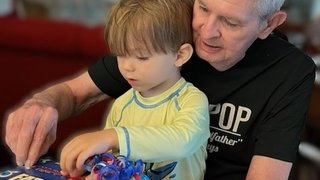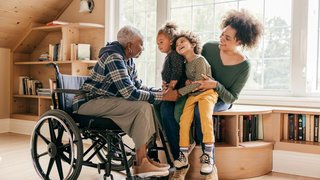Life after coronavirus: PM&R helps patients beat muscle weakness, brain fog
June 4, 2020

Six months after COVID-19 hit the U.S., a growing number of patients are entering the long-term phases of recovery – and finding that the virus took its toll on more than just their respiratory systems.
Approximately 80% of patients infected with COVID-19 develop mild-to-moderate symptoms and recover within a few weeks. The other 20% develop more serious symptoms, including severe inflammation and organ damage.
Lying sick in bed at home or in the hospital for an extended period can lead to muscle atrophy – weakening due to limited use. Healthy people can lose approximately 1% to 1.5% of muscle strength per day with bedrest. Those who are sick may lose even more. The average hospital stay for COVID-19 is eight days. In just over a week, a patient could lose 12% of their muscle strength.
For many, recovery has been among the steepest physical and mental challenges they've endured. Patients are reporting substantial functional deficits, such as lingering lung problems, muscle weakness, and cognitive concerns ranging from "brain fog" to delirium.
Navigating these complex issues requires a team approach. With our Physical Medicine and Rehabilitation (PM&R) physician team in Dallas and at our new UT Southwestern Medical Center at Frisco, patients can access comprehensive support to recover from coronavirus.
PM&R specialists identify barriers to daily functioning and help patients overcome them – often without surgery or long-term medications. Our team partners with experts in orthopedics, neurology, pulmonary, and other specialties to design individual rehab plans to address each patient's concerns.
The earlier a patient with coronavirus can begin rehab, the better their chances for a full recovery. Through a combination of therapy, cognitive exercises, and specialized rehab – a program that we’re calling COVID RECOVER – the PM&R team can help patients overcome the effects of COVID-19 on their lungs, muscles, and brain function.
Breathing easier after COVID-19
Physical therapist Traci Bacon demonstrates three easy but effective breathing exercises patients can do at home to improve their lung capacity after recovering from the novel coronavirus.
Long-term lung recovery
Respiratory effects of COVID-19 are its signature: dry cough, trouble breathing, and in the most serious cases, necessity of ventilator support to breathe.
The lung tissue is susceptible to damage from the virus itself and from inflammation as the body’s overstimulated immune system attacks it. As a result, the patient's lung function may dramatically decrease. When the lungs cannot properly fill with air, the rest of the body suffers from reduced oxygenation. This leads to fatigue and weakness, even with the slightest physical effort.
During recovery from COVID-19, patients have reported feeling winded after simple tasks such as brushing their teeth or taking a shower. This can be a shock, especially for patients who were highly active before they were infected.
How PM&R can help
PM&R focuses on the entirety of a patient's health. As part of your personal rehab plan, we will discuss environmental and lifestyle modifications that support healthy lung function at home and returning to normal activities as soon as possible.
Avoiding secondhand smoke – and quitting if you smoke – is key. Cardiovascular exercise such as walking and jogging, if able, will help your lungs work better. Deep breathing exercises, including yoga and meditation, improve respiratory health with the added bonus of stress relief.
Developing strong core muscles can help improve your breathing. However, the core is one of the muscle groups that appears to be most quickly affected by COVID-19.
Increasing flexibility and mobility after COVID-19
See nine stretching exercises that patients can do at home to enhance their flexibility and mobility after recovering from COVID-19.
Muscle impacts of COVID-19
Many viruses cause myalgia, or non-specific body pain. Think back to a severe cold or flu – chances are, every part of your body felt achy, even your teeth and hair. COVID-19 data indicate that nearly 45% of patients experience muscle pain during their illness.
COVID-19 research suggests, however, that the pain and weakness could be related to actual muscle damage from the illness. A study published in Emerging Infectious Diseases found that rhabdomyolysis, a breakdown of muscle tissue, may be a late side effect of the virus. During this breakdown, enzymes such as creatine kinase and lactate dehydrogenase enter the bloodstream. Such enzymes have been detected in COVID-19 patient bloodwork.
The core muscles and proximal leg muscles such as the gluteals tend to atrophy quickly. These muscles help us to stand, walk, and sit with good posture, and improve breathing efficiency. Proper posture creates more room for the diaphragm to move. The diaphragm is one of the main muscles that helps the lungs expand and contract.
How PM&R can help
There's no way to predict which patients will have muscle symptoms – the virus affects everyone differently. We've treated marathoners who have struggled to walk during COVID-19 recovery, and less-active patients who could move fine aside from increased joint pain.
But we do know that overcoming muscle weakness is particularly challenging for older patients. Muscle mass naturally decreases as we age, making it harder for seniors to rebuild muscle strength.
A PM&R doctor can determine the extent of muscle loss and target areas to prioritize for strength training. Our physical and occupational therapists will show you how to perform simple exercises – starting in your bed at the hospital. As you grow stronger, we'll guide you in flexibility and mobility exercises to continue regaining function at home. See more at-home strength exercises.
As you start to grow stronger, you'll likely want to dive back into your daily routines. But it's important to pace yourself and be forgiving if it is harder than expected. For example, if you normally run three to five miles a day, try walking a mile to see how that affects you before attempting more strenuous activities. And for those who are typically not very active, gradually adding physical activity into the daily routine will be helpful.
As you near the end of treatment, your care team will assist you in determining whether work or home accommodations might be useful. For example, using an ergonomic cushion at your desk chair or installing a shower grab bar could help reduce the risk of further injury.
Improve your conditioning after COVID-19
One of our physical therapists demonstrates 11 exercises – from sitting and standing techniques to heel raises – that patients can do at home to rebuild their strength and conditioning after COVID-19.
Brain tissue issues: Delirium, memory loss
Patients in Texas and around the world are experiencing various cognitive issues due to COVID-19. According to a study in JAMA Neurology, more than 36% of patients with COVID-19 in Wuhan, China, experienced dizziness, loss of smell or taste, or even stroke.
Another study in the New England Journal of Medicine found that 58 of 64 patients hospitalized for COVID-19 in Strasbourg, France, exhibited confusion, agitation, and poor concentration.
In some patients, cognitive symptoms are subtle. Patients say they have used the term "brain fog" to describe their difficulty concentrating or forgetting things, like placing a big order on Amazon. Others have trouble remembering how to do simple daily tasks, like using their smart TV.
More severe symptoms could be caused by delirium, a disorienting condition caused by serious illness or infection. Delirium is common in older patients. Staying in intensive care, having to use a ventilator or various sedating medications, and factors such as isolation or being treated by providers in full personal protective equipment (PPE) can be very disorienting.
COVID-19 may infect the body via angiotensin-converting enzyme 2 (ACE2). ACE2 is found on the surface of organs, including the brain. Researchers believe the virus binds with ACE2, invades the body, and starts wreaking havoc. In the brain, ACE2 is found close to the nerves that facilitate the senses of smell and taste. This could explain why some patients with coronavirus have difficulty with cognitive functions.
Related reading: Postoperative delirium in seniors: Recognizing the symptoms, reducing the risks

COVID RECOVER
To visit with a Physical Medicine & Rehabilitation specialist regarding our COVID RECOVER program, call 214-645-2080 or request an appointment online. Telehealth and in-person appointments are available in Dallas and Frisco.
How PM&R can help
Specialists on our PM&R team have advanced training in neurological rehabilitation and psychology and can help patients resolve cognitive impairments like memory loss and decreased attention or problem-solving.
Your doctor will identify how your brain functioning has been affected to determine the best approach to care. In many cases, cognitive therapy exercises from a speech and language pathologist can help the brain retrain or rebuild pathways to resume the ability to perform normal tasks again, such as recalling phone numbers.
As part of your rehab plan, we may recommend lifestyle adjustments to continue making progress at home. For example, addressing underlying conditions such as high blood pressure, diabetes or depression, which can affect cognitive function, as well as getting adequate sleep. Performing daily cognitive activities or playing certain games can be helpful. Sometimes our rehabilitation psychologist can help you with developing strategies for dealing with the stress of recovery and the occasional anxiety that we see in those recovering from COVID-19.
A few closing thoughts
COVID-19 is a new virus. We are learning more every day about how it affects patients and how we can help them recover.
But we know this for certain: Deficits in breathing, moving, and thinking can take a major toll on your personal and professional quality of life long after the virus leaves your body.
If you are struggling with daily functions after COVID-19, connect with our PM&R team. We can create a personalized care plan to overcome immediate challenges and improve your long-term health and wellness.











